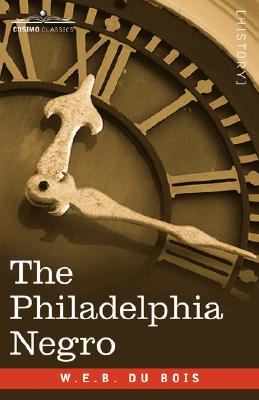Synopsis
Originally published in 1899, The Philadelphia Negro is a sociological study of the blacks living in Philadelphia in 1896-7. DuBois was hired by the University of Pennsylvania to conduct the study, under what some believe to be false pretenses. Some suspect that the study was meant, by those funding it, to show how the black community was responsible for a number of problems within the city. The report they received, however, was of quite a different nature. The Philadelphia Negro was the first sociological study of black urban Americans ever conducted. It detailed their lives, their social structures, their education, their marriages, and their jobs. The study sought to illuminate ways in which philanthropy could help the people living in Philadelphia's Seventh Ward. It did not presume, as many people did at the time, that blacks lived in poor conditions due to an innate weakness in their race. This scholarly work serves as an excellent reference for students of history and sociology.
From the Back Cover
In 1897 a young sociologist who was already marked as a scholar of the highest promise submitted to the American Association of Political and Social Sciences a "plan for the study of the Negro problem". The product of that plan was the first great empirical book on the Negro in American society. William Edward Burghardt DuBois (1868-1963), Ph.D. from Harvard (class of 1890), was given a temporary post as Assistant in Sociology at the University of Pennsylvania in order to conduct in-depth studies on the Negro community in Philadelphia. The provost of the university was interested and sympathetic, but DuBois knew early on that white interest and sympathy were far from enough. He knew that scholarship was itself a great weapon in the Negro's struggle for a decent life. The Philadelphia Negro was originally published by the University of Pennsylvania Press in 1899. One of the first works to combine the use of urban ethnography, social history, and descriptive statistics, it has become a classic work in the social science literature. Both the issues the book raises and the evolution of DuBois's own thinking about the problems of black integration into American society sound strikingly contemporary. Among the intriguing aspects of The Philadelphia Negro are what it says about the author, about race in urban America and about social science at the time, but even more important is the fact that many of DuBois's observations can be made - in fact are being made - by investigators today. In his introduction to this edition, Elijah Anderson traces DuBois's life before his move to Philadelphia. He then examines how the neighborhood studied by DuBois has changed over the years, and he compares thestatus of blacks today with their status when the book was initially published.
Les informations fournies dans la section « A propos du livre » peuvent faire référence à une autre édition de ce titre.
